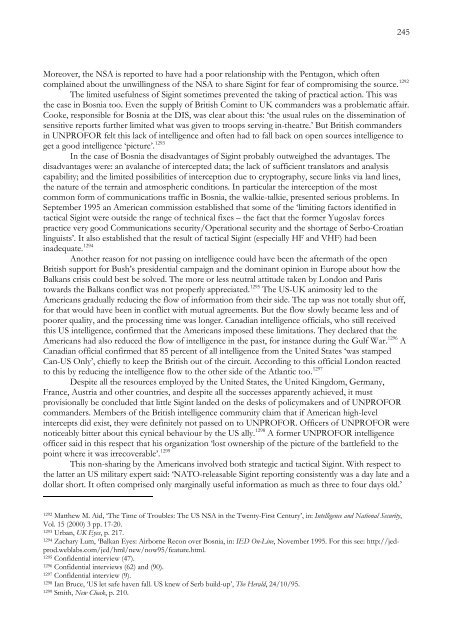C. Wiebes - Intelligence en de oorlog in Bosnië 1992-1995. De rol van de inlichtingen- en veiligheidsdiensten - Engels
C. Wiebes - Intelligence en de oorlog in Bosnië 1992-1995. De rol van de inlichtingen- en veiligheidsdiensten - Engels
C. Wiebes - Intelligence en de oorlog in Bosnië 1992-1995. De rol van de inlichtingen- en veiligheidsdiensten - Engels
- No tags were found...
You also want an ePaper? Increase the reach of your titles
YUMPU automatically turns print PDFs into web optimized ePapers that Google loves.
245Moreover, the NSA is reported to have had a poor relationship with the P<strong>en</strong>tagon, which oft<strong>en</strong>compla<strong>in</strong>ed about the unwill<strong>in</strong>gness of the NSA to share Sig<strong>in</strong>t for fear of compromis<strong>in</strong>g the source. 1292The limited usefulness of Sig<strong>in</strong>t sometimes prev<strong>en</strong>ted the tak<strong>in</strong>g of practical action. This wasthe case <strong>in</strong> Bosnia too. Ev<strong>en</strong> the supply of British Com<strong>in</strong>t to UK comman<strong>de</strong>rs was a problematic affair.Cooke, responsible for Bosnia at the DIS, was clear about this: ‘the usual rules on the dissem<strong>in</strong>ation ofs<strong>en</strong>sitive reports further limited what was giv<strong>en</strong> to troops serv<strong>in</strong>g <strong>in</strong>-theatre.’ But British comman<strong>de</strong>rs<strong>in</strong> UNPROFOR felt this lack of <strong>in</strong>tellig<strong>en</strong>ce and oft<strong>en</strong> had to fall back on op<strong>en</strong> sources <strong>in</strong>tellig<strong>en</strong>ce toget a good <strong>in</strong>tellig<strong>en</strong>ce ‘picture’. 1293In the case of Bosnia the disad<strong>van</strong>tages of Sig<strong>in</strong>t probably outweighed the ad<strong>van</strong>tages. Thedisad<strong>van</strong>tages were: an avalanche of <strong>in</strong>tercepted data; the lack of suffici<strong>en</strong>t translators and analysiscapability; and the limited possibilities of <strong>in</strong>terception due to cryptography, secure l<strong>in</strong>ks via land l<strong>in</strong>es,the nature of the terra<strong>in</strong> and atmospheric conditions. In particular the <strong>in</strong>terception of the mostcommon form of communications traffic <strong>in</strong> Bosnia, the walkie-talkie, pres<strong>en</strong>ted serious problems. InSeptember 1995 an American commission established that some of the ‘limit<strong>in</strong>g factors id<strong>en</strong>tified <strong>in</strong>tactical Sig<strong>in</strong>t were outsi<strong>de</strong> the range of technical fixes – the fact that the former Yugoslav forcespractice very good Communications security/Operational security and the shortage of Serbo-Croatianl<strong>in</strong>guists’. It also established that the result of tactical Sig<strong>in</strong>t (especially HF and VHF) had be<strong>en</strong><strong>in</strong>a<strong>de</strong>quate. 1294Another reason for not pass<strong>in</strong>g on <strong>in</strong>tellig<strong>en</strong>ce could have be<strong>en</strong> the aftermath of the op<strong>en</strong>British support for Bush’s presid<strong>en</strong>tial campaign and the dom<strong>in</strong>ant op<strong>in</strong>ion <strong>in</strong> Europe about how theBalkans crisis could best be solved. The more or less neutral attitu<strong>de</strong> tak<strong>en</strong> by London and Paristowards the Balkans conflict was not properly appreciated. 1295 The US-UK animosity led to theAmericans gradually reduc<strong>in</strong>g the flow of <strong>in</strong>formation from their si<strong>de</strong>. The tap was not totally shut off,for that would have be<strong>en</strong> <strong>in</strong> conflict with mutual agreem<strong>en</strong>ts. But the flow slowly became less and ofpoorer quality, and the process<strong>in</strong>g time was longer. Canadian <strong>in</strong>tellig<strong>en</strong>ce officials, who still receivedthis US <strong>in</strong>tellig<strong>en</strong>ce, confirmed that the Americans imposed these limitations. They <strong>de</strong>clared that theAmericans had also reduced the flow of <strong>in</strong>tellig<strong>en</strong>ce <strong>in</strong> the past, for <strong>in</strong>stance dur<strong>in</strong>g the Gulf War. 1296 ACanadian official confirmed that 85 perc<strong>en</strong>t of all <strong>in</strong>tellig<strong>en</strong>ce from the United States ‘was stampedCan-US Only’, chiefly to keep the British out of the circuit. Accord<strong>in</strong>g to this official London reactedto this by reduc<strong>in</strong>g the <strong>in</strong>tellig<strong>en</strong>ce flow to the other si<strong>de</strong> of the Atlantic too. 1297<strong>De</strong>spite all the resources employed by the United States, the United K<strong>in</strong>gdom, Germany,France, Austria and other countries, and <strong>de</strong>spite all the successes appar<strong>en</strong>tly achieved, it mustprovisionally be conclu<strong>de</strong>d that little Sig<strong>in</strong>t lan<strong>de</strong>d on the <strong>de</strong>sks of policymakers and of UNPROFORcomman<strong>de</strong>rs. Members of the British <strong>in</strong>tellig<strong>en</strong>ce community claim that if American high-level<strong>in</strong>tercepts did exist, they were <strong>de</strong>f<strong>in</strong>itely not passed on to UNPROFOR. Officers of UNPROFOR wer<strong>en</strong>oticeably bitter about this cynical behaviour by the US ally. 1298 A former UNPROFOR <strong>in</strong>tellig<strong>en</strong>ceofficer said <strong>in</strong> this respect that his organization ‘lost ownership of the picture of the battlefield to thepo<strong>in</strong>t where it was irrecoverable’. 1299This non-shar<strong>in</strong>g by the Americans <strong>in</strong>volved both strategic and tactical Sig<strong>in</strong>t. With respect tothe latter an US military expert said: ‘NATO-releasable Sig<strong>in</strong>t report<strong>in</strong>g consist<strong>en</strong>tly was a day late and adollar short. It oft<strong>en</strong> comprised only marg<strong>in</strong>ally useful <strong>in</strong>formation as much as three to four days old.’1292 Matthew M. Aid, ‘The Time of Troubles: The US NSA <strong>in</strong> the Tw<strong>en</strong>ty-First C<strong>en</strong>tury’, <strong>in</strong>: <strong>Intellig<strong>en</strong>ce</strong> and National Security,Vol. 15 (2000) 3 pp. 17-20.1293 Urban, UK Eyes, p. 217.1294 Zachary Lum, ‘Balkan Eyes: Airborne Recon over Bosnia, <strong>in</strong>: IED On-L<strong>in</strong>e, November <strong>1995.</strong> For this see: http://jedprod.weblabs.com/jed/hml/new/now95/feature.html.1295 Confid<strong>en</strong>tial <strong>in</strong>terview (47).1296 Confid<strong>en</strong>tial <strong>in</strong>terviews (62) and (90).1297 Confid<strong>en</strong>tial <strong>in</strong>terview (9).1298 Ian Bruce, ‘US let safe hav<strong>en</strong> fall. US knew of Serb build-up’, The Herald, 24/10/95.1299 Smith, New Cloak, p. 210.





